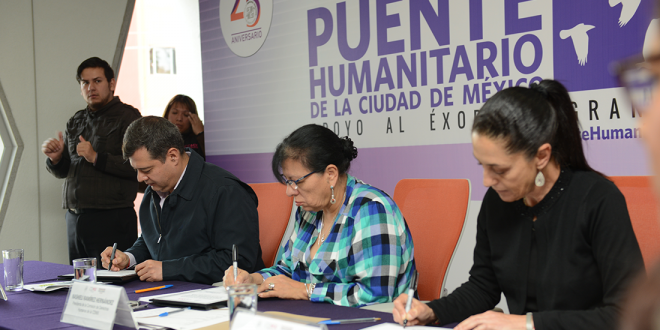Boletín 167 Bis/2018
28 de octubre de 2018
The Ombudsperson at the Human Rights Commission in Mexico City (CDHDF), Nashieli Ramírez Hernández, called to action to address this humanitarian emergency, emphasizing human safety, instead of national or internal security.
Before the oficial departure of the brigades making up the Humanitarian Bridge, the Ombudsperson – along with the current Head of Government, José Ramón Amieva, and the Head of Government-elect, Claudia Sheinbaum Pardo – assured that this mass exodus places the country in an unprecedented emergency, given the particular situation of forced displacement of the more than 7000 migrants coming from Central America and other countries.
The Ombudsperson stressed that the majority of this migrant exodus is made up of women and children, with great participation from the elder population. In the face of such a situation of increased vulnerability, she insisted on disregarding actions based on national security in response to this phenomenon. She asserted that, “following the responsibilities and attributions laid out by the constitutional and legal frameworks in Mexico City, there exists a duty to work, as a State, to create a bridge of humanitarian aid to enable everyone the exercise and enjoyment of their human rights”.
Claudia Sheinbaum Pardo reiterated that, following the premise of Article 11 in the new Constitution, her team will join the efforts of the Humanitarian Bridge, coordinated by the CDHDF. She stated that “the goal is to address this humanitarian crisis starting now, to establish Mexico City as a hospitable city, and to attend the migrants’ needs”. She indicated that she has already urged the leaders of the 16 municipalities in Mexico City to install centers for the collection of necessary supplies, so that citizens can participate in solidarity with the migrants.
Finally, José Ramón Amieva Gálvez announced that 306 government officials from 11 administrative agencies in Mexico City, accompanied by 47 service vehicles, will take part in the humanitarian brigade to aid the migrant exodus, which has already reached the State of Oaxaca. He explained that said public officials will focus on attending the human rights to food, health, and social integration, immediate social protection schemes, water supply and treatment measures, and promotion of equality. He highlighted the main services that will be provided: preventive medicine, attention to endemic and gastrointestinal disease, and physical injuries, psychological counseling, laboratory testing, health and hygiene promotion, epidemiological surveillance, and counseling on legal and judicial matters, as well as nutrition and hydration.
Versión PDF
 Comisión de Derechos Humanos de la Ciudad de México
Comisión de Derechos Humanos de la Ciudad de México
